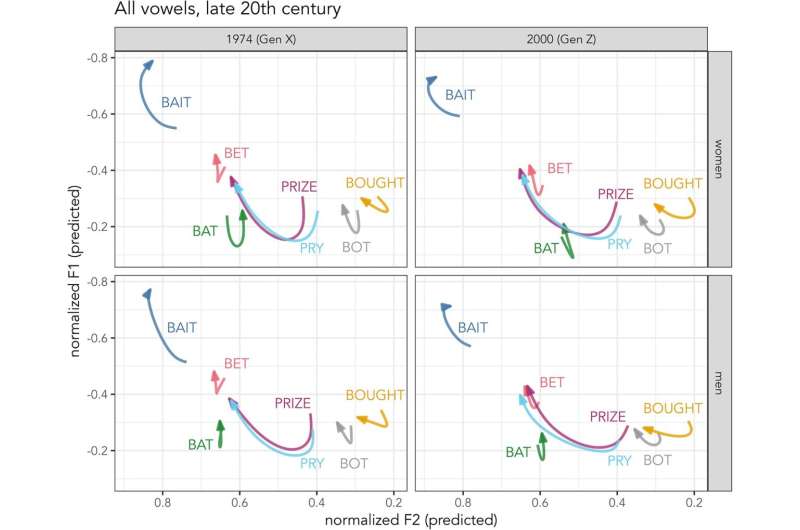This article has been reviewed according to Science X's editorial process and policies. Editors have highlighted the following attributes while ensuring the content's credibility:
fact-checked
trusted source
proofread
Speech study finds classic Georgia accent fading fast

A collaborative study between the University of Georgia and Georgia Tech has found the classic Southern accent is undergoing rapid change in Georgia. The instigator? Generation X.
"We found that, here in Georgia, white English speakers' accents have been shifting away from the traditional Southern pronunciation for the last few generations," said Margaret Renwick, associate professor in UGA's Franklin College of Arts and Sciences department of linguistics and lead on the study. "Today's college students don't sound like their parents, who didn't sound like their own parents."
The researchers observed the most notable change between the baby boomer generation (born 1943 to 1964) and Generation X (born 1965 to 1982), when the accent fell off a cliff. The study, "Boomer Peak or Gen X Cliff? From SVS to LBMS in Georgia English," is published in the current issue of the journal Language Variation and Change.
"We had been listening to hundreds of hours of speech recorded in Georgia and we noticed that older speakers often had a thick Southern drawl, while current college students didn't," Renwick said. "We started asking, which generation of Georgians sounds the most Southern of all? We surmised that it was baby boomers, born around the mid-20th century. We were surprised to see how rapidly the Southern accent drops away starting with Gen X."
The UGA/Georgia Tech team is the first to identify the accent shift in Georgia.
"The demographics of the South have changed a lot with people moving into the area, especially post World War II," said co-author Jon Forrest, UGA assistant professor in the department of linguistics. Forrest noted that what the researchers see in Georgia is part of a shift noted by others across the entire South, and furthermore, other areas of the U.S. now have similar vowel patterns. "We are seeing similar shifts across many regions, and we might find people in California, Atlanta, Boston and Detroit that have similar speech characteristics," Forrest said.
The analysis was carried out with recordings of white individuals native to Georgia, born from the late 19th century to the early 2000s. The researchers focused on the way the recorded speakers pronounced vowels. The team found that older Georgians pronounced the word "prize" as prahz and "face" as fuh-eece, but the youngest speakers use prah-eez and fayce. Former UGA graduate student and co-author Joseph A. Stanley, now an assistant professor at Brigham Young University, implemented the statistical modeling.
"Using transcribed audio, we can use a computer to estimate where you put your tongue in your mouth when you pronounce each vowel, which gives us a quantitative metric of accent," said Lelia Glass, assistant professor in the School of Modern Languages at Georgia Tech. Marcus Ma, a Georgia Tech undergraduate student working with Glass, devised a tool to streamline the transcription process.
"Changes to the diphthong in 'prize' are the oldest characteristic pronunciation in Southern speech, that can be traced back well over 100 years," Renwick said. "The Southern pronunciation of words like 'face' emerged in the early 20th century. These are distinctive features of the traditional Southern drawl."
While this study used archived as well as new recordings of white speakers from Georgia, as linguistic patterns differ for other ethnic groups, the team is now pursuing the study of cross-generational accents among the Black population.
The exploration of spoken language patterns in Georgia underscores the intricate interplay between generational shifts, societal dynamics and linguistic evolution. As regional accents transform and adapt, the traditional Southern drawl undergoes a remarkable change, with the elongated vowel sound gradually yielding to new patterns favored by younger generations. As this investigation reshapes the understanding of accent variations, it also highlights the need for continued exploration, particularly among diverse ethnic groups.
More information: Margaret E. L. Renwick et al, Boomer Peak or Gen X Cliff? From SVS to LBMS in Georgia English, Language Variation and Change (2023). DOI: 10.1017/S095439452300011X
Provided by University of Georgia



















